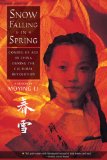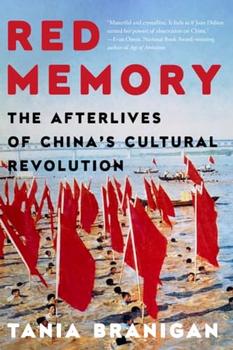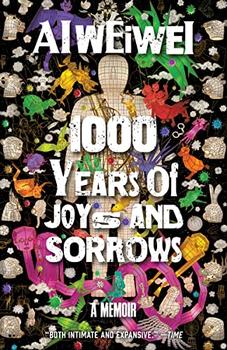Summary | Excerpt | Reviews | Beyond the book | Read-Alikes | Genres & Themes | Author Bio

Coming of Age in China During the Cultural Revolution
by Moying LiLi reconstructs her childhood and girlhood through a series of
fragile and powerful vignettes: Fragile because the pre-revolutionary China that
informs her values and shapes her childhood is obliterated before she is old
enough to take her place within it; powerful because Li's family's suffers
cruelties so arbitrary that they are almost surreal, and are threatened by a
savagery wholly indifferent to the familial or the personal.
The brutal ironies commence with the Great Leap Forward: Li's family and
neighbors eagerly relinquish pots, pans and metal objects to Li's father's
homemade brick furnace – until they realize that they don't know how to make
iron or steel. Then in 1959 comes the government-ordered eradication of
sparrows: Li's family and neighbors enthusiastically shoot the birds or drive
them off by banging pots and pans. Li's family is happy and proud when the
newspaper announces that over 400,000 sparrows have been destroyed in their
city. But without the sparrows to keep the insect population in check, the rice
and wheat crops fail and millions of people die of starvation and suffer
deprivation.
But Li's deprivations are not only physical: The cessation of education, the
degradation of teachers, and the destruction of, and preservation of, books is
central to Li's story. Li's father is a thoughtful and literate man, and when he
is arrested, his treasured library of Chinese and western classics is thrown
into sacks and carted off with him. (Later, Li's brother discovers an old man
guarding a warehouse full of condemned books from which he rescues The Call
of the Wild, a childhood favorite.) From the labor camp where he is
imprisoned, Li's father sends his children a reading list—and it is this list
that inspires Li to begin what she calls a "secret reading club." She borrows
forbidden books and dictionaries from friends and relatives and sets about the
daunting task of mastering Russian, American and English literature, including
Shakespeare. Fortified and inspired by her reading, Li boldly smuggles a copy of
Huckleberry Finn to a friend by hiding it in a box labeled "FOOD." The
friend covers the forbidden tome in the jacket of a book by Chairman Mao, and
devours it in secret. In the wasteland of the Cultural Revolution, forbidden
books are sustenance, escape, and an emotional reunion with those Li has lost.
Li's story, though rooted in China, will speak to every young person struggling
to realize his or her ambitions, and to every loving family facing hardship or
loss. Young readers will appreciate Li's plainspoken style, her restraint, and
the clarity with which she describes the unthinkable as well as the beautiful.
Adult readers will find much to admire, and will discover not only a poignant
story of a vanished world, but a meditation on what parents can and cannot give
their children: They cannot guarantee peace or prosperity, they cannot always be
present, but as Li puts it, parents can bestow a profound "sense of direction."
![]() This review was originally published in The BookBrowse Review in May 2008, and has been updated for the
March 2010 edition.
Click here to go to this issue.
This review was originally published in The BookBrowse Review in May 2008, and has been updated for the
March 2010 edition.
Click here to go to this issue.

If you liked Snow Falling in Spring, try these:

by Tania Branigan
Published 2024
An indelible exploration of the invisible scar that runs through the heart of Chinese society and the souls of its citizens.

1000 Years of Joys and Sorrows
by Ai Weiwei
Published 2022
In his widely anticipated memoir, "one of the most important artists working in the world today" (Financial Times) tells a century-long epic tale of China through the story of his own extraordinary life and the legacy of his father, the nation's most celebrated poet.
Your guide toexceptional books
BookBrowse seeks out and recommends the best in contemporary fiction and nonfiction—books that not only engage and entertain but also deepen our understanding of ourselves and the world around us.